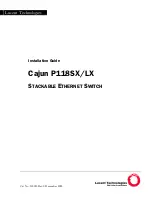
PRG AV4202N
© (2007) Pirelli Broadband Solutions S.p.A. All Rights Reserved. Proprietary Use Pursuant to Cover Page Instructions.
116
OGU 930500275-A1
Advanced Section
FIGURE 16.
IP Address Distribution Panel
IPSEC
Internet Protocol Security (IPSec) is a series of guidelines for the protection of
Internet Protocol (IP) communications. It specifies procedures for securing pri-
vate information transmitted over public networks. The IPSec protocols include:
AH (Authentication Header) provides packet-level authentication, ESP (Encap-
sulating Security Payload) provides encryption and authentication, IKE (Internet
Key Exchange) negotiates connection parameters, including keys, for the other
two services.
Services supported by the IPSec protocols (AH, ESP) include confidentiality
(encryption), authenticity (proof of sender), integrity (detection of data tamper-
ing), and replay protection
(defense against unauthorized resending of data). IPSec also specifies meth-
odologies for key management. Internet Key Exchange (IKE), the IPSec key
management protocol, defines a series of steps to establish keys for encrypting
and decrypting information; it defines a common language on which communi-
cations between two parties is based. Developed by the Internet Engineering
Task Force (IETF), IPSec and IKE together standardize the way data protection
is performed, thus making it possible for security systems developed by differ-
ent vendors to interoperate.
Access this feature either from the 'VPN' menu item under the 'Services' tab, or
by clicking its icon in the 'Advanced' screen. The 'Internet Protocol Security (IP-
Sec)' screen appears.
Block Unauthorized IP
Select the 'Enabled' check box to block unauthorized
IP packets to Discus. Specify the following parameters:
•
Maximum Number of Authentication Failures
The maximum number of
packets to authenticate before blocking the origin's IP address.
















































